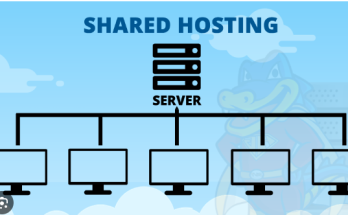Introduction (200-300 words)
- Define shared hosting and its importance for websites.
- Introduce the significance of choosing the right shared hosting service.
- Preview the criteria to be discussed in the article.
Understanding Shared Hosting (300-400 words)
- Define shared hosting and its basic workings.
- Discuss its benefits and limitations compared to other hosting types (VPS, dedicated hosting).
- Explain why shared hosting might be the ideal choice for certain websites.
Factors to Consider when Choosing Shared Hosting (800-1000 words)
Performance and Reliability
- Bandwidth, uptime, and server speed.
- Server resources allocation and limitations.
- Reviews and reliability of the hosting provider.
Features and Tools
- Disk space, databases, and email accounts provided.
- Control panel and ease of management.
- Additional features like SSL certificates, backups, one-click installers, etc.
Customer Support and Service
- Availability of customer support (24/7).
- Support channels (live chat, phone, ticket system).
- Quality and responsiveness of customer service.
Pricing and Plans
- Different pricing structures and packages available.
- Any hidden costs or renewal pricing discrepancies.
- Value for money in terms of features offered.
Scalability and Room for Growth
- Options for scaling up (upgrading to higher plans, adding resources).
- Flexibility to accommodate increased traffic and site growth.
Comparison of Top Shared Hosting Providers (800-1000 words)
- Evaluate and compare at least 5 top shared hosting services (e.g., Bluehost, HostGator, SiteGround, etc.).
- Breakdown the performance, features, customer support, pricing, and user-friendliness of each service.
- Highlight pros and cons based on real user experiences and professional reviews.
Conclusion (150-200 words)
- Summarize the key points discussed.
- Reiterate the importance of choosing the right shared hosting service.
- Offer final recommendations or considerations based on the comparison.
Note:
- Throughout the article, include statistical data, user testimonials, and expert opinions to support your points.
- Use infographics, tables, or bullet points where necessary to enhance readability.
- Aim for a balance between technical details and reader-friendly language.
What is Shared Hosting?
Shared hosting is a type of web hosting where multiple websites are hosted on a single server. It’s a cost-effective option where server resources are shared among various users.
1. Understanding Your Hosting Needs
- Website Requirements: Define your website’s needs in terms of traffic, storage, and features.
- Budget: Determine the budget you can allocate for hosting.
2. Researching Shared Hosting Providers
- Performance: Look for uptime guarantees and server speed.
- Customer Support: Evaluate the quality and availability of customer service.
- Reviews and Reputation: Explore user reviews and ratings on reliable platforms.
3. Key Features to Consider
- Resource Allocation: Check bandwidth, storage space, and limitations on databases or emails.
- Ease of Use: Assess the control panel’s user-friendliness.
- Add-Ons and Extras: Look for free domain registration, SSL certificates, or site backups.
4. Comparing Pricing and Plans
- Introductory vs. Renewal Prices: Pay attention to renewal costs after the initial period.
- Discounts and Offers: Check for introductory discounts and ongoing promotions.
5. Security Measures
- SSL Certificates: Ensure the host provides SSL certificates for secure data transmission.
- Backup Services: Verify if automatic backups are included and how frequently they’re performed.
6. Scalability and Growth
- Room for Expansion: Assess whether the hosting service allows easy upgrades as your website grows.
- Performance Scaling: Check if they provide options for handling increased traffic.
7. Support and Assistance
- 24/7 Support: Ensure the provider offers round-the-clock customer support.
- Technical Expertise: Assess the level of technical assistance available.
8. User Interface and Control Panel
- Demo or Trial: See if the provider offers a demo or trial period to test the control panel.
- Ease of Management: Check if it aligns with your technical skills and preferences.
9. Migration and Transfer
- Ease of Migration: Evaluate the process for migrating an existing website to their hosting.
- Additional Costs: Check if there are extra charges for migration services.
10. Reviews and Final Decision
- Compile Information: Summarize your findings and compare pros and cons.
- Make an Informed Decision: Choose the hosting service that best fits your needs and budget.
Conclusion
Selecting the best shared hosting service involves meticulous research, considering various factors like performance, support, security, and scalability. By assessing your specific requirements and comparing different providers, you can make an informed decision to ensure your website’s success.
Finding the Best Shared Hosting Service: A Comprehensive Guide
In today’s digital landscape, selecting the right shared hosting service can significantly impact your website’s performance, security, and overall success. Shared hosting, a cost-effective option, allows multiple websites to share a single server’s resources. However, finding the best-shared hosting service requires a thoughtful evaluation process. Let’s delve into the essential steps to identify the optimal shared hosting provider:
Step 1: Assessing Your Hosting Needs
Understanding your website’s requirements is crucial. Factors to consider include:
- Traffic Volume: Estimate the expected website traffic to ensure the hosting plan accommodates it.
- Resource Needs: Determine the disk space, bandwidth, and databases required for your website.
- Technical Requirements: Consider the programming languages, CMS compatibility, and email hosting needs.
Step 2: Performance and Reliability
Reliability and uptime are paramount. Look for:
- Uptime Guarantees: Opt for providers offering 99.9% uptime guarantees.
- Server Speed: Evaluate server response times and loading speed using performance metrics.
- Server Infrastructure: Check for SSD storage, CDN availability, and server locations for better performance.
Step 3: Security Measures
A secure hosting environment is crucial for safeguarding your data and visitors’ information. Consider:
- SSL Certificates: Ensure the hosting service provides free or affordable SSL certificates.
- Firewalls and Security Protocols: Look for robust security measures, including malware scanning and DDoS protection.
- Regular Backups: A hosting service that offers automated backups can be a lifesaver in case of data loss.
Step 4: Customer Support
Responsive and knowledgeable customer support is invaluable:
- 24/7 Support: Ensure the provider offers round-the-clock support via various channels.
- Support Quality: Look for reviews and testimonials regarding the provider’s support responsiveness and expertise.
Step 5: Features and Scalability
Consider the additional features and scalability options:
- Control Panel: Check for an intuitive and user-friendly control panel like cPanel or Plesk.
- Scalability Options: Assess whether the provider allows easy upgrades as your website grows.
- Additional Services: Look for perks like free domain registration, site migration, or website builders.
Step 6: Pricing and Value for Money
Evaluate the pricing structure and value offered:
- Introductory vs. Renewal Pricing: Be aware of any significant price hikes upon renewal.
- Value-added Services: Consider the overall value and not just the price point.
- Money-Back Guarantee: Check if the provider offers a satisfaction guarantee or a trial period.
Conclusion
Choosing the best-shared hosting service involves meticulous research and consideration of various factors. By assessing your specific needs and scrutinizing providers based on performance, security, support, features, and pricing, you can find the ideal hosting service that aligns with your website’s requirements and budget.
Remember, what works best for one website might not suit another, so weigh your options carefully before making a decision.



